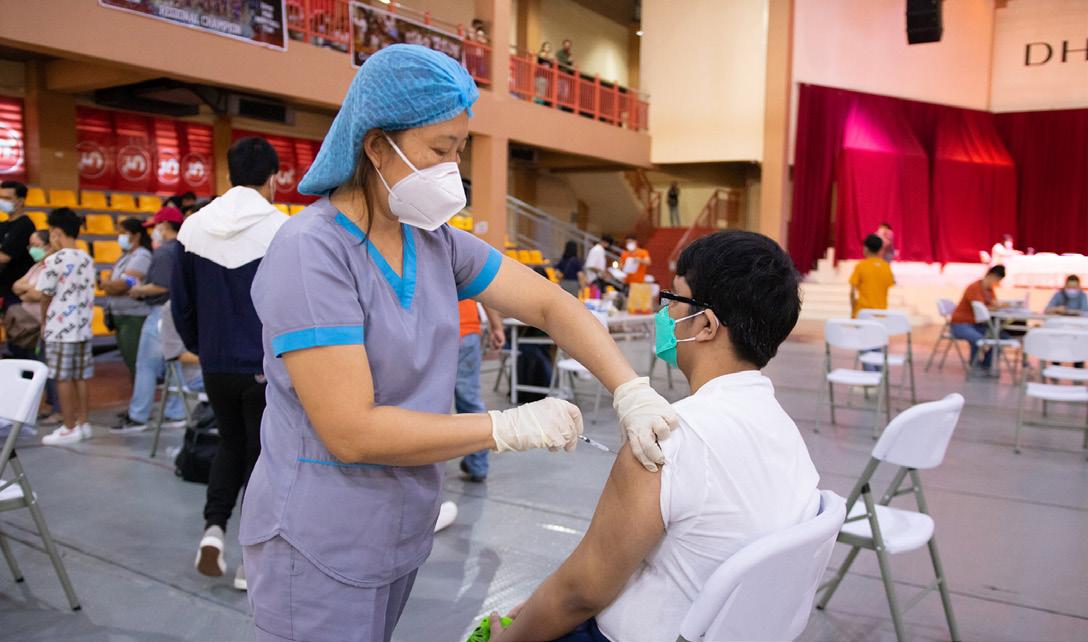
23 minute read
0 naman ang ‘conditional’ at
DHVSU obtains milestone of inoculating 3,000 Honorians
by Patrick Bryan Porras
Advertisement
As part of its aim to provide full protection to its students, teaching staff, and other university personnel, Don Honorio Ventura State University (DHVSU) reached the milestone of fully vaccinating nearly 3,000 Honorians against COVID-19, based on data from the university.
DHVSU accepted walk-in vaccinations in three batches, which were then held at the university gymnasium from November 5, 2021, to February 11, 2022.
First batch, first blood
With over 600 Honorians receiving vaccine jabs, the first roll-out of inoculation was successfully carried through with the collaborative effort of DHVSU President Enrique G. Baking, VP Quiambao, University Student Council (USC), Provincial Health Office of Pampanga, and other university personnel.
In light of this, an online survey was conducted, which served as the basis to know who amongst the Honorians was willing to get vaccinated. However, only 18-year-old and older students were given the chance to receive their dose of defense against the said respiratory disease.
Second wave of preventive dose
While the prescribed age limit during the first launch of the said program was over 18, in the second roll out, however, the university already allowed students whose age ranged from 12 and above to be vaccinated.
Henceforth, students from Laboratory High School (LHS) and Senior High School (SHS) were merged into college students, from which it was recorded that nearly a thousand Honorians received vaccine jabs during the second wave of the inoculation measure, resulting in an increased vaccination rate at the university.
Third cluster and a booster
Meanwhile, the last batch of vaccine roll out granted by the provincial Local Government Unit (LGU) was considered a "wish granted" at the end of the university, as it didn't only give unvaxxed, regular students the chance to get a vaccine jab, but it also paved the way for some postgraduate students enrolled in the graduate school to be inoculated with a booster shot.
On the records provided by Quiambao, there were more than 600 Honorians, including those postgrads, who grabbed the opportunity to acquire the COVID-19 vaccine in the third roll out.
In a talk with Rigette Ryan S. Ramos, current principal of Bacolor High School, the initiative of the university in conducting a walk-in vaccination program is significant and systematic. "This kind of programs is very helpful sa mga katulad namin, na kailangan na talaga ng booster, tsaka parang you will be given an opportunity para mavaccine, and napaka-systematic ng initiative na ito," Ramos built on.
The said measure is part of its preparation for the possible commencing limited face-to-face classes which will depend on the province's COVID situation. MASS VACCINATION. Honorians receive their vaccines shots at the university gymnasium on November 5 to 11, 2022. Photo by Cyrylle Daphne Z. Ocampo
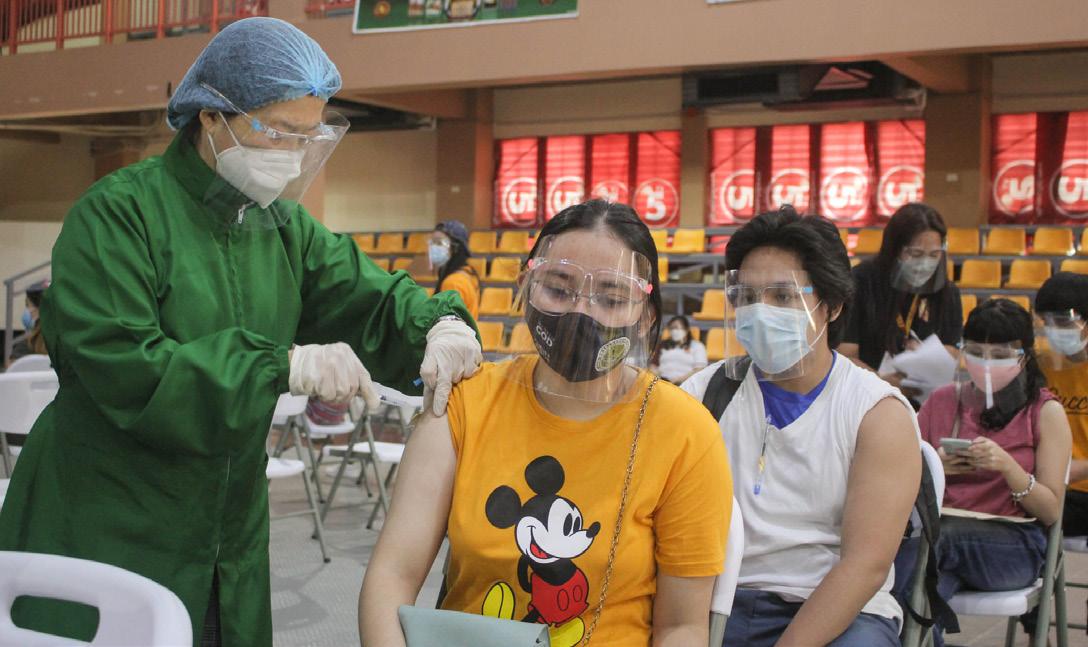
2 estudyante mula CEA, CSSP nagtamo...
professional field na tayo, ‘di na natin magagawa mga ‘to. Naniniwala din kasi ako na too much of something is not good,” dagdag pa ng estudyante.
Binigyang-diin ng dalawa ang mga salik na nakatutulong sa kanilang pag-aaral tulad ng pagiging masigasig, determinado, at pagkakaroon ng matibay na support system.
Mensahe pa ni Saulo para sa mga nais ding makakuha ng mataas na marka, “Keep your eyes
from page 2 | on your goal, and do your best to achieve that goal.” “Don’t pressure yourself too much, ang grades numbers lang 'yan na will not matter after we graduate. Cliché man pero, grades don't define you,” paalala ni Eligio. Sa grado sa kolehiyo, ang flat 1.0 o uno ang pinakamataas na gradong pwedeng makuha habang ang 3.0 ang passing mark, 4.0 naman ang ‘conditional’ at bagsak naman kapag 5.0.
“WE HAVE TO PROTECT YOU TO THE FULLEST” Baking sets out DHVSU’s measures for eyed limited in-person classes by Patrick Bryan Porras
DHVSU President Enrique G. Baking on December 14, 2021, laid out the university's measures for the upcoming face-to-face classes in 2022, emphasizing that they are doing everything to protect the Honorians against COVID-19. "As much as possible, we have to protect you [students] to the fullest. 'Yan ang commitment namin, to give you the full protection," Baking made mention in an interview.
Additional Vaccine Batch
One of the main points highlighted by the SUC president is the university's aim to build on another batch of Honorians to be vaccinated.
According to Baking, there will be a set of vaccinations that will be administered before the end of December, considering that there are still students who are not yet vaccinated. "I understand the continuing activity of the university because this is a part of the commitment to fully vaccinate our students. Thus, there will be another set of vaccinations, maybe two or three times".
He added that by the end of December, it is expected that 90 to 95% of more than 42,000 Honorians are already vaccinated. "With that figure, we would say that our students are already safe and secured, but of course we cannot still discard the possibility of complications," Baking appended, noting that Honorians should not still be complacent, even fully inoculated already.
Persuasion and consultations
The president also shed light on the university's plans for the students who choose to not get vaccinated, highlighting the adverse effect of vaccines to be protected against the abovementioned respiratory disease. "We need to do some consultation, perhaps with the parents, and of course with the students and will explain to them the adverse effects of vaccination," said Baking.
While can not force the students to get vaccinated, he mentioned that the university will do everything possible to persuade the students to afford vaccination.
No vaccine card, no entry
In light of this, Baking expounded that a vaccination card will be one of the requirements for the limited in-person classes. "Kailangan ang vaccination card, siguro gagawa ng paraan ang university, separating the boys from the girls," he pronounced.
He also elaborated that the university will make a mechanism on how to divide the Honorians, considering that the university cannot still house all its students to be back in their second home.
In addition, he clarified that the mode of learning, if ever the limited face-to-face classes start, will still be multi-modal, in which half of the students will take inperson classes, and the other half will utilize the virtual learning environment.
Stern measures for studs outside Pampanga
When asked about the university's plans for students who stayed outside the province since the COVID-19 escalated, Baking said that stricter measures will be considered in order to ensure the safety of those students. "Considering the geographical location where they come from, the more we need to be very strict," he elucidated.
Some of the requirements that have to be contemplated are a student's history of having disease, vaccination status, and travel history.
Concerning this, he raised a challenge to the Honorians that they have to manifest honesty when being assessed soon about the aforementioned considerations. "This is a rigorous work, and we will be spending a lot of time in doing all of these, sana naman 'yung mga estudyante magsalita sila ng totoo".
Booster shots for boosted protection
Still part of the university's vaccination initiative, Baking drew attention to providing Honorians booster shots of the COVID-19 vaccine to guarantee safety and increase the protection rate of students. "We will try hard para mabooster. For equal protection of the law, dapat ma-booster din kayo. We will try to work that out starting January 2022," Baking assured.
As of this writing, limited face-to-face classes are set to commence in the early part of 2022.
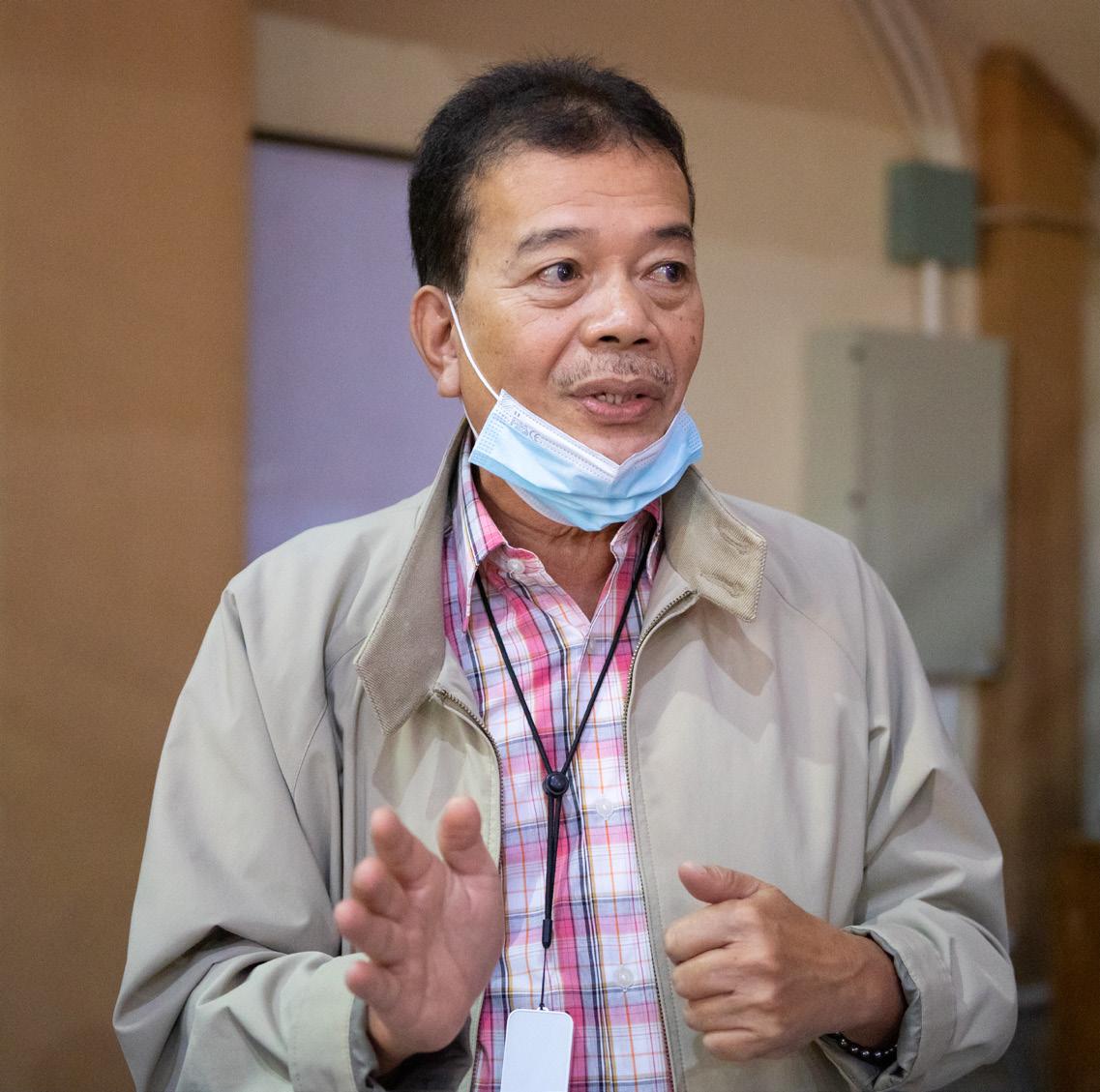
Teachers must sight online stude behavior triggers: Soliman
by John Marco Nucum
"Students' behavior does not occur in isolation – there is a function and purpose so we, instructors, have to identify what triggers them."
These were the words of the resource speaker, Dr. Benny Soliman, during the Office of Student Affairs-hosted a webinar last September 22, designed for the DHVSU teaching personnel on how to respond with the prevalent issues and concerns about student discipline in online classrooms.
The event aimed to acquire basic knowledge on students' behavior, to be familiar with the common inappropriate behaviors of students, and apply effective strategies in managing them particularly in the online setting.
During his opening remarks, Dr. Fernando Pamintuan, Office of Student Services Director, considered the event as a teachable moment to all educators in ensuring that all learners will be able to apply discipline while they are still under the guidance and custody of DHVSU. "We may have the most effective and best plan on how to execute and make our students master our subject courses, yet if students grow undisciplined – no education and quality has been applied,"Dr. Pamintuan quipped.
Understanding students' behavior
The presentation was outlined into three divisions from which understanding first the behavior of learners in the online classroom is discussed.
Dr. Soliman tackled the 'ABCs' of behavior: Antecedent which means what triggers the behavior; Behavior which refers to the behavior itself; and the corresponding consequence that was made.
The speaker also noted some basic principles in understanding behavior, students' individual situations that may influence their online behavior, and events that trigger emotional reaction or problem behavior.

Soliman
Common misbehaving students and intervention to be done
In the second outline, Dr. Soliman enumerated and discussed the common types of misbehaving students that instructors usually encountered, which include the complainer, the messy type, the procrastinator, the plagiarizer, and the interruptor.
The management and possible intervention that instructors should utilize were tackled in the last outline which talked about managing students' misbehavior.
The last outline addressed three levels to be done which include [1] Preventive Level, [2] Coping in the Moment, and [3] Reducing Problem Behavior. "In managing students' behavior, we really have to exert efforts to prevent such misbehavior,"he quoted.
Dr. Soliman, at the end of the webinar, also cited some of the major dos and don'ts that educators should follow in the implementation of class rules.
Gender mainstreaming, sensitivity highlited in GAD webinar
by Patrick Bryan Porras and Marc Navida
WITH THE webinar entitled, "Gender Sensitivity in Times of COVID-19 Pandemic," Commission on Higher Education (CHED) Director for Office of Programs and Standard Development (OPSD) emphasized on September 3, the necessity to mainstream gender in times of COVID-19 pandemic.
According to Dir. Cherrie Melanie Ancheta-Diego, resource speaker of the webinar, mainstreaming gender will pave the way for the rounding principles of inclusivity for everyone regardless of the age, gender preference, and figure. "That's what we do as members of an academic institution, as presidents, vice presidents, GAD focal persons because it is through here that we are able to make use of digital platforms," Diego underscored.
Moreover, the CHED OPSD director also mentioned the basic concepts about gender through an interactive activity that was participated by the Honorians and the university staff present in the webinar.
The resource speaker also brought up the United Nation Women's recent study, revealing that at least 243 million women globally aged 15-49 have been subjected to sexual and physical violence, perpetrated by an intimate partner in the span of 12 months, this pandemic.
"Emerging data shows that, since the outbreak of COVID-19, violence against women and girls (VAWG), and particularly domestic violence has intensified," the gender advocate noted.
With such looming issues, Diego preceded that it is necessary for everyone to uphold the most basic human decency which is respect and apply it to all human forms, regardless of age, ability, religion, educational attainment, race, ethnic group, status in society, marital status, region of origin, color, sexual orientation, and gender identity.
The well-claimed GAD activist also shed light on how relevant mental health is nowadays wherein she asserted, "Prioritizing mental health in this time of pandemic will relieve you from stressful moments of your life".
On a separate note, the GADvocate applauded the university for successfully meeting the requirements of the Philippine Commission on Women, exceeding the required 5% benefit utilization for GAD General Appropriates.
Additionally, she stated that the university should further engage as a champion and cocreator of learning to higher education that will advance necessary changes in attitudes, behaviour and beliefs about gender sensitivity.
SUC President Enrique G. Baking, who opened the webinar also drew attention to the achievements of | to page 9
Indus seizes 2nd consecutive triumph in Luzon-wide campus press awards, places 3rd most outstanding
by Lawrence Layug
THE INDUSTRIALIST once again racked up awards in multiple categories and was hailed as 3rd Most Outstanding Campus Publication at the Luzon-wide edition of the 2nd Assumption Outstanding Campus Press Awards (AOCPA), held last January 12.
Among the individual category awardees were: 1st Place Outstanding Editorial Writer – John Derrick J. Cordova 1st Place Outstanding Editorial Cartoonist – Eddie Marie Talens 1st Place Outstanding Photojournalist – Frances R. de Leon 2nd Place Outstanding Opinion Writer – by Patrick Bryan Porras 3rd Place Outstanding Sports Writer – by Daniel Louis Mallari
5th Place Outstanding Investigative Journalist – John Zenrick Valdez
John Derrick Cordova, editor-in-chief of the publication, felt honored to be recognized and proud of his fellows for their achievement. "It's not the usual pressconference-atmosphere kind of competition. Since it is a free topic, may edge talaga ang lahat," he added.
In the 1st AOCPA, only student-journalists and campus publications in Pampanga were awarded. Among the new contenders were UPLB Perspective and DLSU's Ang Pahayagang Plaridel.
The annually held AOCPA is spearheaded by Regina, the official student publication of the University of Assumption, to honor exceptional skills of campus journalists in Luzon.
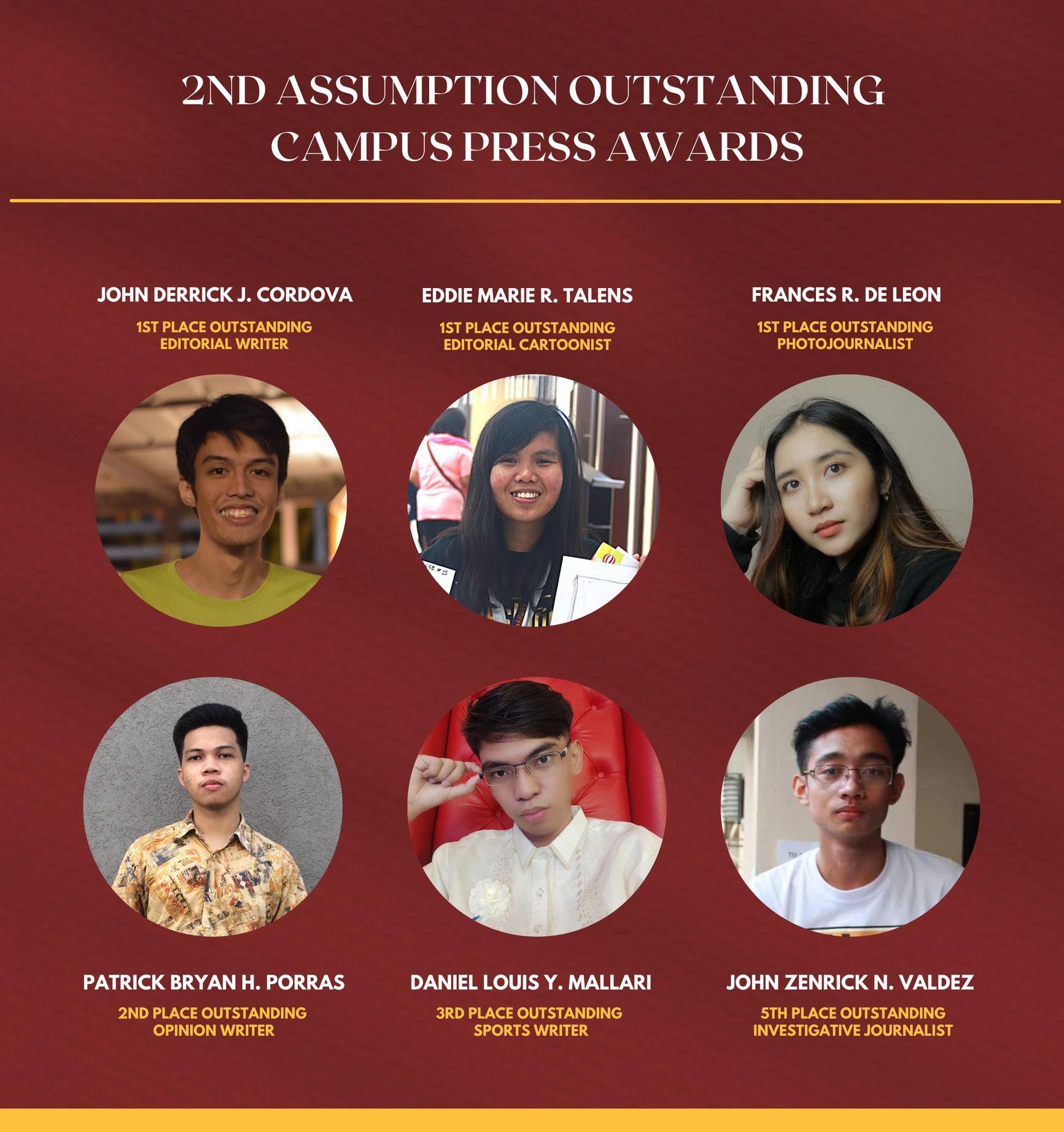
2 educ alum land on licensure exam top spots
by Daniel Louis Y. Mallari
COLLEGE OF Education - Department of Elementary Education alumni Rom Kiefer G. Soliman and Edmond P. Ocampo Jr. finished on top spots in the recent September 2021 Licensure Examination for Teachers (LET).
Soliman achieved a 91.60% rating to notch 2nd place while Ocampo listed a 90.80% rating to attain 6th place.
In the Elementary Level LET, DHVSU achieved an 83.60% first-timer passing rate and a 77.19% repeater passing rate combining for an 80.38% overall passing rate.
Meanwhile, in the Secondary Level LET, the university posted a 52.38% first-timer passing rate and a 47.44% repeater passing rate for an ovevrall passing rate of 49.17%.
According to the Professional Regulation Commission, 4,883 elementary teachers out of 8,726 examinees (55.96%) and 10,318 secondary teachers out of 17,863 examinees (57.76%) passed.
The College of Education and the university administration has acknowledged the feats of its alumni and has expressed their congratulatory remarks to Soliman and Ocampo for bringing honor to the college and program. TOP NOTCH. Rom Kiefer G. Soliman (left) and Edmond P. Ocampo Jr. (right) landed on top spots in the September 2021 Licensure Examination for Teachers (LET). Photo: COESC
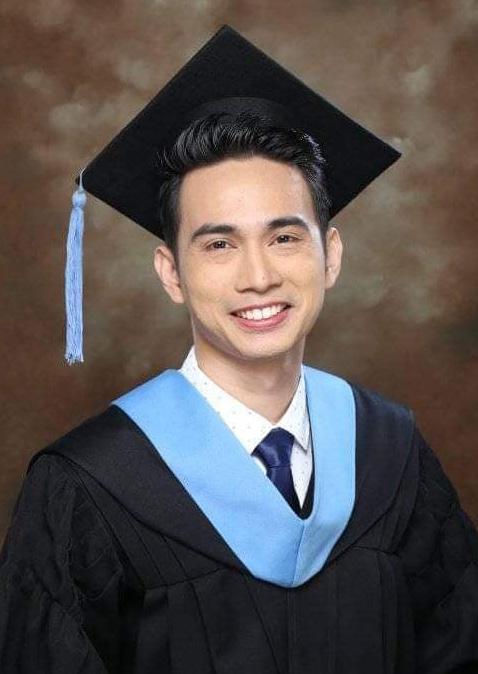

Youth-nited wins majority of USC seats in first online university election
by John Marco Nucum
THE FIRST-EVER virtual University Student Council (USC) election was held on December 17, marking yet another massive victory for the Youth-nited Partylist, with seven out of ten candidates earning a winning spot in the office seat.
YN elected on majority seats
Banner bets USC president re-elect Jensen Niño Baking, an incumbent from the 2019-2020 executive board, and now-USC Vice President Percival Rongcal Jr. led the newly-elected student council from the party that has held the highest position in the student body since 2016.
Completing the USC seats are their party fellow, Senator on Records Vielka Roque, Senator on Audit Jessica Mercado, Senator on Business Affairs Nicole Angela Zapata, Senator on Student Affairs Arnie Manalastas, and pioneering Senator on Gender and Development Crystal Jade Pasion.
According to the Student Commission on Elections (SCOMELEC), the official voter turnout was 73.18%, accounting for 13,210 votes cast from the seven university campuses via the DHVSU Learning Management System platform. On December 18, the newly-elected USC officers were formally proclaimed. "Gagawin po namin ang mga ipinangako naming plataporma at ia-adopt din namin ang mga platforms ng TIKDO Student Alliance as maybe deemed necessary. Wala po tayong partylist-based distinction so lahat po ng makabubuti sa students ay gagawin natin," Baking remarked during the proclamation day.
Wins for the opposition
This year's USC election also highlighted the triumph of the opposition party with TIKDO Student Alliance securing three of the remaining senatorial positions.
With their officer-elects, Senator on Finance-elect Missy Ruela Cortez, Senator on Student Services-elect Vhieya Paula Fernandez, and Senator on Public Information-elect Natasha Mae Pascual, the highest student body is now packed with diverse electoral bodies. "Ang [mga] ipinagmamalaki ng Tikdo Student Alliance for the DHVSU USC 2022. Maramingmaraming salamat sa bawat isa sa inyo na tumayo, lumaban, at naghangad ng pagbabago kasama ang buong partido ng TIKDO Student Alliance," the alliance's statement imparted on their Facebook page.
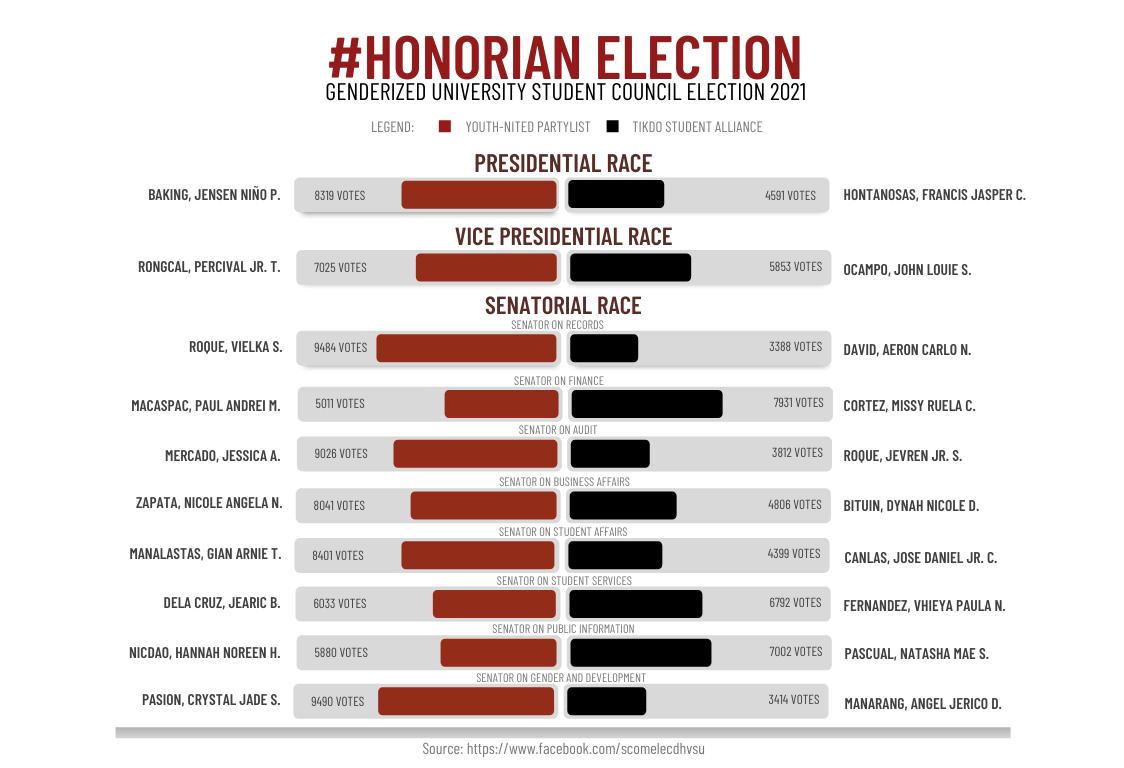
DHVSU's 18-Day EVAW campaign launch centers Safe Spaces Act
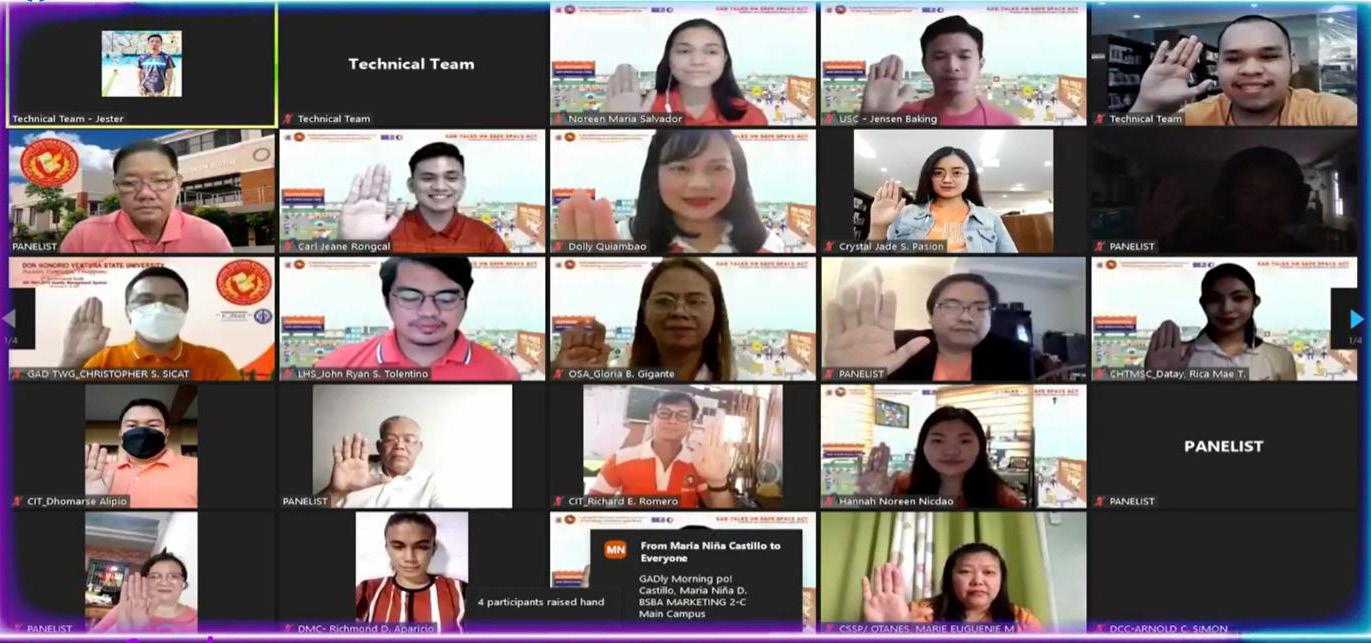
HONORIAN SANCTUARY. The University's student leaders, officials, admins and staffs raising their right hand as a sign of advocating for Violence Against Women together with the resource speaker, Prosecutor JT Leonardo C. Santos, LL.M. that was held via Zoom.
by Jevelyn Julao
AS DHVSU commenced its 18Day Campaign to End Violence Against Women (EVAW) with the theme, "Honorian Ako: Sa Akin Magmumula ang Respeto," Republic Act No. 11313, otherwise known as Safe Spaces Act was unraveled, highlighting equality, safety, and security for all forms of gender.
Held via Zoom and simulcasted on a Facebook Livestream on November 29, 2021, the opening program brought about the abovementioned law, with Atty. Jose Theodore Leonardo Santos, Asst. City Prosecutor, Office of the City Prosecutor-CFSP serving as the resource speaker.
Santos legitimized the power of the RA 11313, which penalizes sexual harassment based on gender.
He also clarified that the said law, in line with the fundamental constitutional provisions regarding human dignity and human rights, is expanding the concept of discrimination and "protects persons of diverse sexual orientation, gender identity, and/or expression". "It thus recognizes genderbased sexual harassment as including, among others, misogynistic, transphobic, homophobic, and sexist slurs," the law added.
The lawyer also expounded on the significance of respect to individual choices, and he also shed light on gender sensitivity, highlighting important terminologies encompassing genders such as sexual orientation, gender identity, gender expression, transgender, and gender transition. "It is of equal importance to promote respect to all gender against discrimination and sexual harassment. A person is born biologically as a man and a woman, but do not forget the gift of God, which is the gift of choice, and that choice must be respected as part of our human rights," he emphasized.
In light of this, the University Student Council also elucidated their aspiration clearly, “our goal is to attain a society that does not belittle the biological capabilities of women and children but rather recognizes their significant contribution to the society,” USC President Jensen Niño Baking affirmed.
As part of the campaign's opening program, a GAD hour talk was conducted in the afternoon that was participated by other different departments to illuminate and encourage each student’s awareness regarding VAW.
Episode 1 of "Kumustahan Session" also kicked off right after the GAD hour talk.
The 18-Day campaign runs from November 25 to December 12, aiming to gear everyone toward adversities especially the vulnerable.
Gender mainstreaming..
from page 6 | the university, particularly the GAD office which he termed "Contemporary Academic Marshals"in implementing programs, webinars, and conveying equality.
The aforementioned webinar was carried through after the First Friday Mass presided by Rev. Fr. Ariel D. Limjoco, which was streamed live on DHVSU Facebook page.
FIRST OF ITS KIND: GAD webinar caps empowerment on solo parent, differently-abled Honorians
by Patrick Bryan Porras
IN COOPERATION with the Office of Student Services (OSS), DHVSU Gender and Development (GAD) Office organized a webinar on September 24, 2021 with solo parent and differently-abled students serving as the point of convergence for the first time.
Prefaced by Dr. Gloria B. Gigante, OSA Director, the webinar was considered as historical in the university as it focused on providing empowerment to the aforementioned sector through character building and resilience in the midst of the COVID-19 crisis.
According to Dr. Dolores Quiambao, VP for Student Affairs and Services (SAS), having a unit for single-parent and PWD is "extraordinarily odd" yet "a wish come through".
She added that it is part of their commitment to engage everybody in all affirmative action programs of the university. "Very historical itong webinar na ito– this is the first time that we'll be holding a webinar that is solely intended for solo parents and differentlyabled students," Quiambao emphasized.
Meanwhile, Ms. Angienette person with a disability, you'll C. Evangelista, Resource Speaker know your strength, know your of the webinar expounded weaknesses. Always remember on the topic, "SP and PWD that it is a matter of perspective, Empowerment and Mental how we see the situation, how Health," in which she shared her we look at the situation," she also own experiences as a solo parent appended.
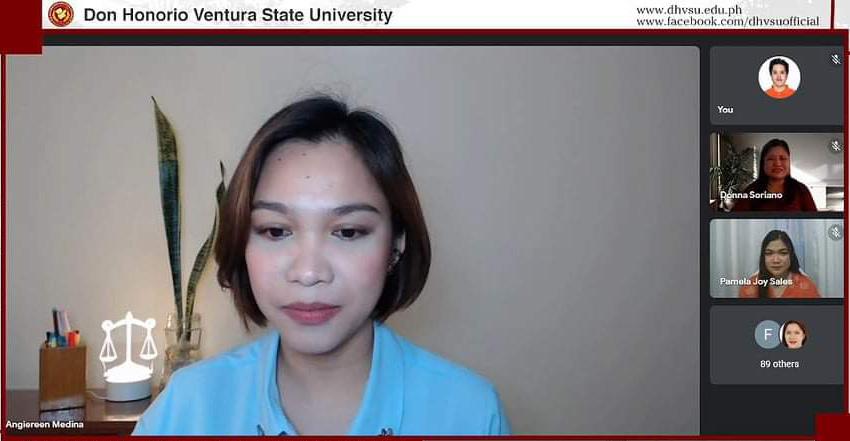
MIABE-ABE TAMU, ABE. The university held its first webinar that is solely intended for solo parents and differenty-abled students that was led by Ms. Angienette C. Evangelista, MA RGC, PRm. Screengrab from DHVSU Facebook page. and in working with PWD. "Iyong struggles, iyong difficulties na pinagdaanan ko along the way gave me enough energy to pursue my dreams," Evangelista underscored. "I hope, as a solo parent and
20 arkis pass boards; DHVSU garners 73.39% passing rate
by Mark Pangilinan
DHVSU College of Engineering and Architecture successfully formed 20 licensed Architects on the licensure examination held last August 27 & 29, 2021.
The students' endeavor generated a 90.91% passing rate for the 1st Takers, which paved the way for the university to obtain an overall passing rate of 73.39%.
According to PRC, 560 out of 849 takers passed the board exam, which accounts to a 65.96% national passing rate.
RGADC III intensifies call to end violence against women, children with disabilities
by Catherine Valerio
THE REGIONAL Gender and Development Committee (RGADC) called for ending violence against women and children living with disabilities amid the 18-day Campaign to End Violence against Women Campaign.
This was presented by the University GAD Focal Person and RGADC officer, Dr. Dolores T. Quiambao, during the 2021 RGADC III Advocacy Program to End Violence Against Women (VAW), last November 26, 2021.
In their presented findings, there is a higher rate of violence against women with disabilities recorded compared to violence against men with disabilities. Furthermore, maltreatment cases against women with disabilities far exceed that of women without disabilities.
In the country, in a span of almost 11 months of 2021, a total of 386 persons with disabilities abuses have been reported. The nature of cases includes physical abuse, economic abuse, psychological abuse, acts of lasciviousness, unjust vexation, voyeurism, rape, murder.
The committee has also highlighted that women and children with disabilities are as susceptible to all forms of violence as the rest.
This dilemma presents an intersection with gender and disability that deepens forms of social prejudice, discrimination, and exclusion. With this, according to RGADC, persons with disabilities are treated as ‘invisible citizens’.
“It’s now a call to end this stigma, it’s high time to stop just listening and hearing, we should do something,” Quiambao added as she encouraged her fellow and webinar viewers.
RGADC coordinates genderrelated activities in the region with the objective to mainstream Gender and Development in the policies, programs, projects, and activities.
11 OSAS-IPU, DPC hold Genderized Indigenous People's Day webinar
by Carlo Samia
WITH the theme Identity: Empowering and Advocating Indigenous People's Culture, the DHVSU Office of Student Affairs and Services – Indigenous Peoples Unit (OSAS-IPU), in partnership with DHVSU Porac Campus (DPC), conducted a webinar and cultural show on Genderized Indigenous Peoples Day, November 5.
Held via a Zoom meeting and simulcasted on Facebook live, the webinar aimed to share and celebrate the culture of the Aeta community through raising awareness on the importance of preserving indigenous cultures through education and empowering indigenous youth themselves as researchers.
The two-part webinar was spearheaded by resource speaker Kevin Constantine Fonseca, Community Development Officer III of the National Commission on Indigenous People (NCIP) Region III.
The first part tackled the Community Development Framework, which shed light on the relation of gender in the extensive need for development programs concerning the IPs and the role of gender in the current plight of the IPs. "Bakit po ito mahalaga sa usapin ng gender, sapagkat kapag nawawala po ang malalaking bahagi ng mga ancestral domains o mga lupaing ninuno ng mga katutubo, nawawalan din po ng puwang ang mga kababaiha," he added, expanding the understanding of the audience on the genderized effects of the problems of the IP communities.
Meanwhile, the second part of the webinar discussed the vital DAYANG HONORIAN. A webinar by the Office of Student Affairs and University Student Council to welcome the new students of the University with the theme of "Keeping the Honorian Blood Alive" via Zoom and Facebook Live. Screengrab from DHVSU Facebook page.
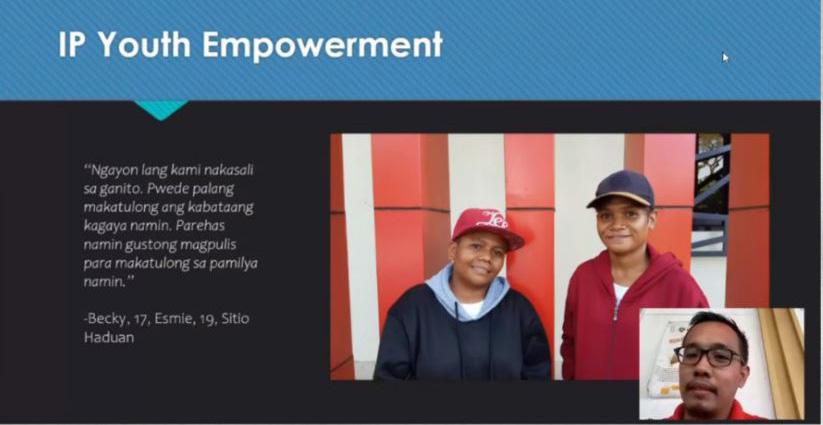
role of IP youth in the field of research not as sources of data but rather as researchers themselves.
According to Fonseca, the NCIP initiated the said program to empower and capacitate IP youth in the field of research, which is a part of the commission's Genderized IP Framework. "I believe ito rin po ang role ng DHVSU sa inyo pong Indigenous Peoples Program, e mayroon sanang pool ng mga IP researchers na makakatuwang po natin sa pagco-conduct po natin ng mga mahahalagang researches po na ito," the community speaker appended.
The activities were attended by the Aeta students from DHVSU Porac Campus.
GFPS calls for ceasing of discriminatory, sexual abuse posting among Honorians
by John Derrick Cordova to the public, despite this, we want the public to be aware that this THE OFFICE of the GFPS office never faltered to provide Student Focal Person released a multifaceted ways to safeguard memorandum on September 22, the rights and welfare of one and 2021 that calls for Honorians to all,"outgoing GFPS Student Focal discontinue sharing and posting Person Paul Andrei Macaspac discriminatory, sexually abusive, stated. and other related content on social Sanctions are also in place media platforms. upon second offense and/or a filed
Students are also discouraged complaint, which are stipulated in to bring up such topics mentioned the university student manual in in group chats primarily if consent adherence to the Safe Spaces Act. is not given by all involved According to the memo, the persons. move is in compliance with the "We are limited by the data Safe Spaces Act of 2019, The privacy law of what we can share Woman in Development and Nation Building Act, The Magna Carta of Women, UN CEDAW, CHED Memorandum Order No.1, series of 2015, and Philippine Commission on Women, Memorandum Circular 2011-01 as well as the continued commitment of the university towards diversity and inclusivity.
This motion of the office is now included in its efforts together with policies and implemented student leveled measures for the vulnerable, the "Know the Signs, End the Silence" mechanism, and an addition of a platform for online counseling.




